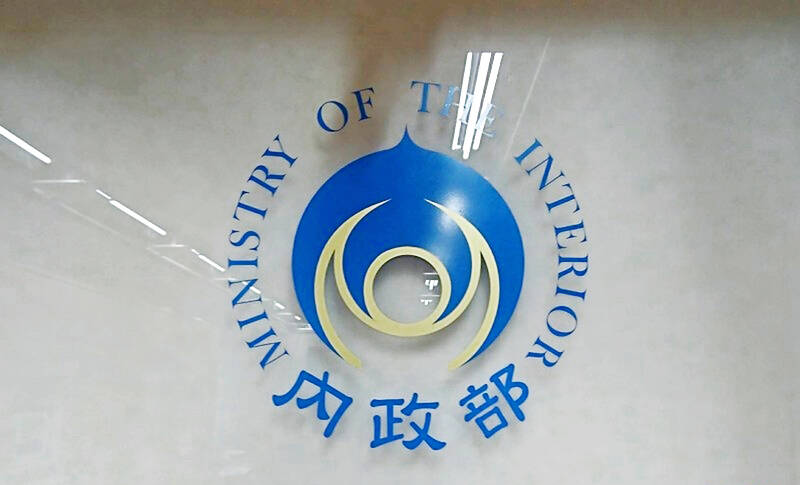Taiwanese who accept money from foreign sources to start a political party could undermine national security and contravene anti-infiltration laws, the Ministry of the Interior said yesterday in response to reports that entertainers and celebrities had been solicited to join a political party with alleged Chinese backing.
Singer Alexis Ho (何以奇) and musician Hsieh Ho-hsien (謝和弦) said that they were among the Taiwanese entertainers who received a letter urging them to join a political party allegedly backed by NT$450 million (US$13.9 million) from overseas sources.
The ministry said in a statement that anyone who forms a political party or develops a networking organization at the direction of foreign entities or with financial support from abroad could contravene the National Security Act (國家安全法) or the Anti-Infiltration Act (反滲透法).

Photo: Huang Hsin-po, Taipei Times
The National Security Act prohibits “initiating, funding, hosting, manipulating, directing or developing an organization” for “a foreign country, Mainland China, Hong Kong, Macau, foreign hostile forces or various organizations, institutions, or groups established or substantially controlled by them,” the ministry said.
It added that under Articles 3 and 4 of the Anti-Infiltration Act, anyone who gives funds or receives donations to engage in elections, recall campaigns or referendums at the instruction or commission of “sources of infiltration” face a maximum prison sentence of five years and a fine of up to NT$10 million.
The ministry urged people to refuse solicitations from China to engage in political activities, which it said would make the participants “pawns in Chinese ‘united front’ tactics against Taiwan,” and also put them at risk of prosecution.
Democratic Progressive Party (DPP) lawmakers said it is no secret that Taiwanese entertainers and social media influencers were making money from endorsement deals in China or being paid to promote tourism there or appear on TV shows.
Such entertainers and influencers should be required to inform their viewers about their Chinese sponsors in their YouTube and social media content, DPP Legislator Michelle Lin (林楚茵) said.
“Many of them are traveling to China to produce propaganda, making videos showing how ‘wonderful’ China is, how enjoyable their experiences there are and how safe its cities are. It is because they receive money from their ‘Chinese sugar daddy’ to endorse the country as a commercial product,” Lin said.
She said Taiwanese influencers were essentially being paid to create pro-China content.
“Our government must come up with measures to require influencers to reveal their financing and the sources behind their videos,” she said.
DPP Legislator Lai Jui-lung (賴瑞隆) said that Beijing’s “united front” tactics have permeated the entertainment industry and cultural sectors.
“Through the promise of earning money and access to China’s market, Beijing is attracting Taiwanese entertainers and social media influencers,” Lai said. “Now, China is cultivating these figures to form a political party and to run in local elections in an attempt to alter Taiwan’s political landscape.”
“It is the long-term goal of the Chinese government to reach into and manipulate Taiwan’s political process,” he said. “Agencies in charge of national security must monitor the development and take a pro-active approach. If people are found to have contravened the law, then they must be investigated right way.”

An undersea cable to Penghu County has been severed, the Ministry of Digital Affairs said today, with a Chinese-funded ship suspected of being responsible. It comes just a month after a Chinese ship was suspected of severing an undersea cable north of Keelung Harbor. The National Communications and Cyber Security Center received a report at 3:03am today from Chunghwa Telecom that the No. 3 cable from Taiwan to Penghu was severed 14.7km off the coast of Tainan, the Ministry of Digital Affairs said. The Coast Guard Administration (CGA) upon receiving a report from Chunghwa Telecom began to monitor the Togolese-flagged Hong Tai (宏泰)

A cat named Mikan (蜜柑) has brought in revenue of more than NT$10 million (US$305,390) for the Kaohsiung MRT last year. Mikan, born on April 4, 2020, was a stray cat before being adopted by personnel of Kaohsiung MRT’s Ciaotou Sugar Refinery Station. Mikan was named after a Japanese term for mandarin orange due to his color and because he looks like an orange when curled up. He was named “station master” of Ciaotou Sugar Refinery Station in September 2020, and has since become famous. With Kaohsiung MRT’s branding, along with the release of a set of cultural and creative products, station master Mikan

Actor Lee Wei (李威) was released on bail on Monday after being named as a suspect in the death of a woman whose body was found in the meeting place of a Buddhist group in Taipei’s Daan District (大安) last year, prosecutors said. Lee, 44, was released on NT$300,000 (US$9,148) bail, while his wife, surnamed Chien (簡), was released on NT$150,000 bail after both were summoned to give statements regarding the woman’s death. The home of Lee, who has retreated from the entertainment business in the past few years, was also searched by prosecutors and police earlier on Monday. Lee was questioned three

RISING TOURISM: A survey showed that tourist visits increased by 35 percent last year, while newly created attractions contributed almost half of the growth Changhua County’s Lukang Old Street (鹿港老街) and its surrounding historical area clinched first place among Taiwan’s most successful tourist attractions last year, while no location in eastern Taiwan achieved a spot in the top 20 list, the Tourism Administration said. The listing was created by the Tourism Administration’s Forward-looking Tourism Policy Research office. Last year, the Lukang Old Street and its surrounding area had 17.3 million visitors, more than the 16 million visitors for the Wenhua Road Night Market (文化路夜市) in Chiayi City and 14.5 million visitors at Tainan’s Anping (安平) historical area, it said. The Taipei 101 skyscraper and its environs —